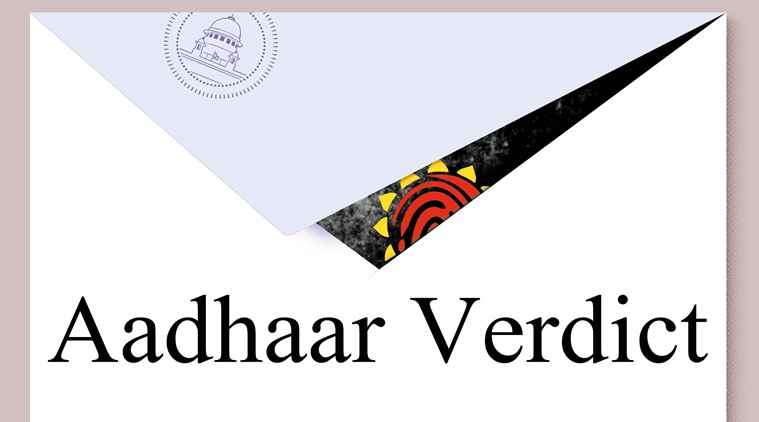What the majority missed
Aadhaar judgment makes a disturbing distinction between the rights of the privileged and the poor.

The Court holds that no person should be deprived of the benefits connected to Aadhaar merely because the person does not possess Aadhaar or if for some reason his Aadhaar identity fails to register.
The prolific majority judgement upholding Aadhaar fails to deal with the complexities of the issues that have emerged since Aadhaar received the backing of law. The conundrums that emerge are philosophical, legal and problems of implementation.
My philosophical opposition essentially arises out of the helplessness of the poor, who have no say if they wish to be beneficiaries of welfare schemes of the state. In the context of privacy and choice, the court makes a distinction between those who are recipients of state entitlements and benefits and those who seek no such benefits. Aadhaar is mandatory for those who receive such benefits. Their consent to an Aadhaar identity is also mandatory. Their consent is not informed by choice but by law. I guess this is a necessary fallout for all those who live below the poverty line: Widows seeking pension, farmers seeking fertiliser subsidies and poor households seeking subsidised gas cylinders. But the right to privacy and informed choice for the privileged is protected.
The concept of an intrusive state or incorporated entities using Aadhaar is anathema when it comes to the privileged. For the poor and the marginalised, it matters not. All this because the state claims that without Aadhaar it has no effective mechanism to deal with the diversion of such benefits. The logic is that if you cannot ensure that subsidies reach targeted beneficiaries, target the poor and the marginalised by stripping them of their right to privacy and informed consent. The argument that because of Aadhaar, the government will save thousands of crores through targeted delivery of benefits is also deeply flawed. There are other more persuasive reasons to account for the diversion of subsidies, which Aadhaar cannot eliminate. Not that there will be no savings but not enough to justify reducing a poor person’s identity to a number.
The judgment suffers from another legal flaw. Both the nature and the expanse of the discourse in the Court clearly demonstrated that Aadhaar cannot possibly be regarded as a Money Bill. Yet, the majority judgment holds it so. A bill to allocate resources for Aadhaar will be a Money Bill but not a legislation that conceptualises Aadhaar and sets up an architecture for dealing with data. The sections in the Aadhaar Act that have been struck down (Sections 57, which allowed for the use of Aadhaar for establishing the identity of an individual for any purpose by the State or a private entity; Section 47,which provided for cognisance of any offence under the Act only on a complaint made by UIDAI and Section 33(2), which allowed for disclosure of information including identity information or authentication records in the interest of national security) deal with matters unconnected with financial resources.
Article 110 of the Constitution defines a Money Bill to mean a bill which deals only with matters relating to taxes and other impositions, allocations, and every aspect of financial disbursements, receipts and obligations and matters incidental thereto, which can be legitimised through legislation passed only by the Lok Sabha, whereas all other legislation has to be passed by both Houses of Parliament. Had the Court held that the Aadhaar Act was not a Money Bill, it would have been struck down in its entirety. The matter would then have gone back to Parliament where the Rajya Sabha would have debated the issues and an appropriate legislation passed after addressing concerns that cannot be addressed in court. Even more fundamental is the constitutional misdemeanour which resulted in the Rajya Sabha being by-passed. A constitutional court should have been sensitive to the undermining of constitutional safeguards without which no law should become effective. A precedent which allows a legislation that impacts us and future generations to be passed in this cavalier manner does not augur well for democracy.
Issues of implementation of the Act in the light of the judgment are even more complicated. By the time issues relating to Aadhaar reached court and were debated, the Aadhaar identity of individuals was being collected both by the government and the private sector and correlated with services that were unrelated to benefits and subsidies. The process of allocating Aadhaar as a form of identity had been delegated to private entities without ensuring the safety of the biometrics collected. The use of Aadhaar was being pushed by the state even for NEET and CBSE examinations.
Telecom companies and the banking sector stored this data. This data is now in the public domain and is liable to be both used and misused without consent. This has done incalculable harm and no retrieval mechanisms are in place. No one, including the state, can ensure that this data be destroyed. This apart, a person’s biometrics collected by private parties has been and is in the future liable to be misused. A data protection law is no consolation, for unlike the misuse of tangible property for which redressal and recovery are possible, the same redressal mechanisms are not possible in the case of stolen data, which is intangible property.
The Court holds that no person should be deprived of the benefits connected to Aadhaar merely because the person does not possess Aadhaar or if for some reason his Aadhaar identity fails to register. In that event, the person has the flexibility to prove his identity through other acceptable documents referred to in the Act. But if the biometrics of a person gets frayed or those who deliver the benefit for spurious reasons refuse to acknowledge the person’s Aadhaar identity, there is no mechanism to deal with such situations. The poor and the marginalised are not empowered enough to fight for their rights and the law and the Court’s declaration, unfortunately, fails to grapple with these realities.
The minority judgment, therefore, rightly holds that a person’s identity cannot be reduced only to a number. For delivering public good, the good of the Republic is far more important.
The writer is a former Union minister and Congress leader
For all the latest Opinion News, download Indian Express App
More From Kapil Sibal
- Reform that isn’tInsolvency and Bankruptcy Code showcases an NDA syndrome: Policies implemented without analysis...
- The quality of justiceJustice Gogoi is right. The union of judiciary with executive is the greatest danger to democracy..
- Choreography of a break-upIt was scripted into coming together of BJP with PDP. In run-up to 2019, polarised J&K will add fuel to BJP fire...








































No hay comentarios:
Publicar un comentario